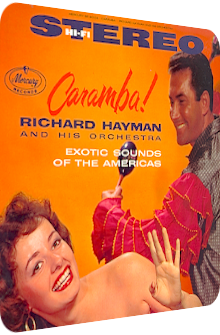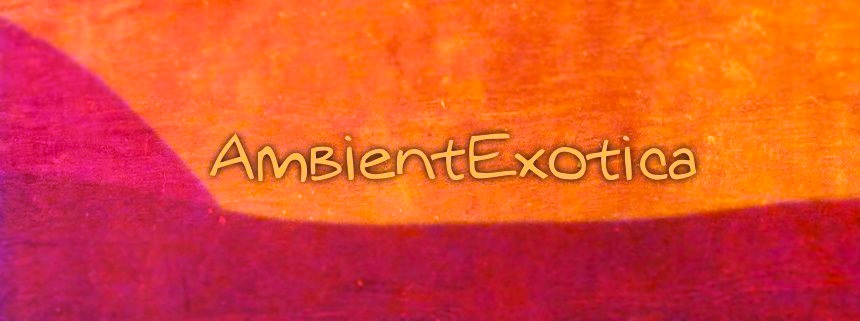
Richard Hayman
Caramba!
1959
If the dear reader thinks of bull riding as a brutish form of animal abuse, things become more grim in the wake of harmonica virtuoso and adept arranger Richard Hayman’s (born 1920) ten-track LP called Caramba!, released in 1959 on his house label Mercury Records. This album is all about the increasingly questionable tradition of bull fighting which, at the end of the day, is not your typical Exotica topic. And indeed, Caramba! cannot enchant with a paradisiac lure, but what it lacks in this field, it delivers aplenty with cavalcades of gleaming brass eruptions, mellow strings and a big scope overall. Its subtitle Exotic Sounds Of The Americas rings a bell and foreshadows the title of Pérez Prado’s Exotic Suite Of The Americas (1960). The smoking hot horns, allotted flutes and ligneous castanets are not particularly noteworthy, for these devices appeared time and again in a decade where orchestral music was firmly in place. However, there is something else to address, no matter that Caramba! is not particularly interesting from a dedicated Exotica viewpoint.
Richard Hayman uses a trick Arthur Lyman revealed in 1959 as well: coming up with a concept album that makes use of well-known and obscure material by embedding it in a story arc that is greater than its respective parts. Similar to Lyman’s The Legend Of Pele (1959), Caramba! uses well-known themes, instant classics and three unique pieces in order to aurally paint the day of the bull fight, from dawn to dusk, according to the liner notes. It is the most momentous of Hispanic days, and so I’m running for my life in the following paragraphs, ignoring the stench of the bull and keeping track of the music.
Welcome to the clasher dome where noble knight and their horses meet for jousting. That’s the glorified transformation, for Alfred Newman’s opener Prelude To “Captain From Castile” implies quite a few bloodier scenes, and rightfully so, for it is a prominent part of the eponymous 1947 movie. The horns are erupting, their fanfares are gleaming, the seething pressure increases, Richard Hayman’s arrangement is top notch, especially so the short mirage of string-fueled contemplation where the upheaval rests for a moment. The strings play a much more prominent role in Hayman’s own El Caballero, a vivacious but all too gleeful afternoon aurora supercharged with bog standard legato washes and slightly more successful galloping percussion and saltatory flutes. This is more Italian than Latin, so beware!
The traditional La Virgen De La Macarena meanwhile is known by virtually every soccer or World Cup fan, as its barnstorming brass motif is very, er, vuvuzela-friendly and rousing. Hayman’s vision has next to nothing to do with Duke Ellington’s Jazz transformation, only the Flamenco guitar remains in the spotlight, hued in darkness. A lamenting majesty is unveiled later on and illumines the scenery complete with sanguine strings and a clever cross-linkage between the various sustain phases and their echoes. The last third is both castanet-driven and a nod toward gypsy traditions and the most exhilarative turmoil of side A. While the rendition of Leroy Anderson’s Saraband matches the bland day scenery of El Caballero with its proto-symphonic euphony – only one horn is hidden in the backdrop –, Hayman’s own Corrida which translates to "course" is a pointillistic amalgamation of festive clarinet tones, warbled fifes and timpani-backed strings. The horns are powerful yet somewhat tame. It is almost hard to believe that this frilly ditty is about a Pamplona-esque run.
Side B launches with a return of Alfred Newman and his score of Captain From Castile. This time, Hayman selects a composition called Conquest, and as the liner notes so fittingly point out, business is getting serious as the matador meets the bull. Climactic and loaded with a military momentum complete with scything snare drums and a sunset-colored pompousness that sounds less danger-evoking than glamorizing, the interstitial stop-and-go notion and the upbeat rising horns make this a seriously great arrangement whose vibrant red complexion exudes Latin pride and a big scope. Indeed, the scope cannot get any bigger, for the fight of the century is over. The album, however, is not.
The four-composition appendix comprises of Hayman’s take on Léo Delibes’ The Maids Of Cadiz who themselves interpret the fight in the artistic form of a dance. Unfortunately, the piece sounds too threnodic, the castanets and welcome marimba additions are entrapped in a soothing Waltz structure, only breaking free for flimsy moments, staying close to Delibes’ vision; the Easy Listening factor is almost completely annihilated… and returns in Jacob Gade’s and Vera Bloom’s famously dichotomous Jalousie. Two countermovements are embroidered here: horns sharp as swords and wonderful string streams which aggrandize and culminate into a noble brass-underlined closure.
The final two pieces are written by Richard Hayman himself: Twilight On The Pampas sounds gorgeously exotic when you read the title out aloud, but is actually a half-mourning evening serenade of reminiscences, cool down phases of dark horns and murky clarinet schemes. Spaixico then returns to acoustic guitar-backed heavens complete with tambourines and scintillating horn vertebrae. Better still: it is a camouflaged version of Pascual Marquina Narro’s classic España Cañí, the Spanish gypsy dance. And so the album ends in a mightily uplifting and good-spirited explosion that even the faithful Exotica listener should endure more than happily.
Caramba! is, as it turns out, one of those Latin records dedicated to a specific festival. Whereas Stanley Black’s Festival In Costa Rica (1955) remains vague about the specific reason for celebration, Richard Hayman reveals his album to be closely tied to bull fighting. The fact is only revealed in the liner notes and cannot possibly be guessed as a golden thread or distinct force whose omnipresence is felt in each and every composition. This, however, is the actual feat of the album! It is one out of thousands of theme albums, I cannot possibly deny this, but whereas the gazillionth holiday album or travelog gem presents the same kind of material more often than not, Hayman only attaches the impression of a great bull fight and the respective festivity from sunset till dusk to the material that has been existed before (excluding his own original tracks).
As such, Caramba! works on two levels: obviously as a mellowed concept album, and then again as one of your archetypical LP’s with a selection of different tracks. In the end, the quality of the material is what counts, and here Caramba! mostly succeeds. Fans of Yma Sumac’s least mystic and most vibrant album Mambo! (1953) will adore the aerose brass gleams and pompous physiognomy of the arrangements. String fans meanwhile can look forward to the flumes and susurrant whorls that float through the center. Even though there are a few bland letdowns such as Saraband and the overly Italian El Caballero on board, Caramba! is a great work which refrains from genuflecting before the almighty Latin timbre. It is available in its original vinyl form and as a remastered download incarnation thereof.
Exotica Review 473: Richard Hayman – Caramba! (1959). Originally published on Jul. 6, 2016 at AmbientExotica.com.
